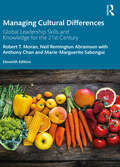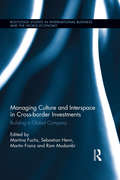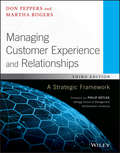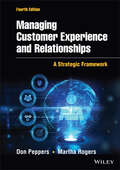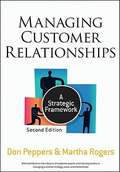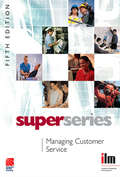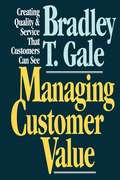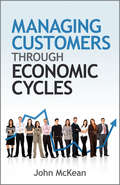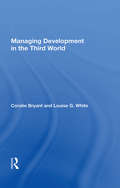- Table View
- List View
Managing Crisis: A Positive Approach (Routledge Library Editions: Management #45)
by Gerald C. Meyers John HolushaFirst published in 1986. Gerald C. Meyers believes that a crisis in business – as in life – is often foreseeable. He also believes that it can be managed, offering an unprecedented opportunity for positive change in a company. If you are to succeed in business today, you must learn to manage rapid change, you must learn to manage crisis. Meyers has developed a plan for practical crisis management. He explains the stages of a business crisis and then details nine common types, incorporating case histories from 31 instructive corporate upheavals and the comments of the executives who went through them. Finally, the author offers ways to minimise the impact of these crises. He lists step-by-step procedures to employ in each case, and gives advice on forming a crisis management team and developing early warning systems.
Managing Cultural Differences
by Robert T. Moran Neil R. Abramson Sarah V. MoranThe world of business for all organizations in the twenty-first century is global, interdependent, complex, and rapidly changing. That means sophisticated global leadership skills are required more than ever today. Individual and organizational success is no longer dependent solely on business acumen. Our ability to understand, communicate, and manage across borders, countries, and cultures has never been as important as it is now. The understanding and utilization of cultural differences as a business resource is a key building block as companies rely on their global reach to achieve the best profit and performance. For this reason, international business and cross-cultural management are key topics in undergraduate business, MBA, and executive education programs worldwide as companies and institutions prepare current and future business leaders for the global marketplace. This exciting new edition of the highly successful textbook, Managing Cultural Differences, seeks to guide students and any person with global responsibilities to understand how culture fits in a changing business world, how to gain a competitive advantage from effective cross-cultural management, and gives practical advice for doing business across the globe. With updated content, new case studies, and a new author team, Managing Cultural Differences is required course reading for undergraduates, postgraduates, and MBA students alike, as well as being of significant value for anyone who sells, purchases, travels, or works internationally.
Managing Cultural Differences: Global Leadership Skills and Knowledge for the 21st Century
by Robert T. Moran Neil Remington Abramson Anthony Chan Sabongui Marie-MargueriteIn today’s global business environment, it is vital that individuals and organizations have sophisticated global leadership skills. Communication and understanding of different cultures are paramount to business success. This new edition of the bestselling textbook Managing Cultural Differences guides students and practitioners to an understanding of how to do business internationally, providing practical advice on how competitive advantage can be gained through effective cross-cultural management. The digitization of the workplace, the integration of artificial intelligence into workplace cultures, cultural responses to crisis, and the value of diversity and inclusion are just a few examples of contemporary issues discussed in this text. This latest edition also begins with a completely new introductory chapter, which provides an overview and connects the themes between chapters for an integrated understanding of the topic. With a wealth of new examples, case studies, and online materials, this textbook is required course reading for undergraduates, postgraduates, and MBA students alike, as well as being a vital tool for anybody selling, purchasing, traveling, or working internationally.
Managing Cultural Differences: Global Leadership for the 21st Century (Managing Cultural Differences Ser.)
by Robert T. Moran Neil Remington AbramsonIn today’s global business environment, it is vital that individuals and organizations have sophisticated global leadership skills. Communication and understanding of different cultures is paramount to business success. This new edition of the bestselling textbook, Managing Cultural Differences, guides students and practitioners to an understanding of how to do business internationally, providing practical advice on how competitive advantage can be gained through effective cross-cultural management. Crises in the Middle East, the weakening of some emerging markets, and the value of diversity and inclusion are just a few examples of contemporary issues discussed in this text, which also introduces a completely new chapter on global business ethics. With a wealth of new examples, case studies, and online materials, this textbook is required course reading for undergraduates, postgraduates, and MBA students alike, as well as being a vital tool for anybody selling, purchasing, traveling, or working internationally.
Managing Cultural Diversity in Technical Professions (Managing Cultural Differences Ser.)
by Lionel Laroche'Managing Cultural Diversity in Technical Professions' provides managers of technical professionals with clear and tested strategies to improve communication and increase productivity among culturally diverse technical professionals, teams, and departments. Dr. Laroche outlines the differences in education and training, career expectations, communication styles, and management expectations in countries around the world. He explains cross-cultural concepts and presents his case for the importance of cross-cultural competence supported by hard data, including charts, tables, and readily accessible schematics.You'll benefit from the author's experience and expertise as a manager and consultant in this area, illustrated by numerous anecdotes, critical incidents, and mini case studies, centered around two central themes:* Most technical professionals do not recognize the impact of cultural differences in their work* Cross-cultural issues lead to a significant under-utilization of talent and affect productivity negatively'Managing Cultural Diversity in Technical Professions' offers proven tactics for improving your personal effectiveness and the efficiency of your multicultural teams, breaking the communication barrier in the multicultural workplace.
Managing Cultural Festivals: Tradition and Innovation in Europe (Routledge Research in the Creative and Cultural Industries)
by Elisa SalvadorThis book aims at renewing the attention on a niche field, Cultural Festivals, so important for valorizing cultural traditions and local heritage visibility as well as social well-being. Following the disruptive consequences of the COVID-19 pandemic, this fragile sector deserves more attention from public authorities and stakeholders at national and European levels with a suitable and dedicated plan of recovery and valorization. This book provides a comparative analysis of Cultural Festivals in Europe, taking insights from an international range of high-level scholarly contributors. Individual chapters highlight and analyse challenges around the organisation, management and economics of Cultural Festivals. As a whole, the book provides a comprehensive overview of scholarly research in this area, setting the scene for the future research agenda. Matters related to educational programs and new audience development, as well as challenges related to digitalization, are also included. The book employs a tradition versus innovation lens to help readers account for the consequences of the digital revolution, new audience development and an educational agenda. The result is a book which will be valuable reading for researchers, academics and students in the fields of event and cultural management and beyond.
Managing Cultural Joint Ventures: An Identity-Image View (Routledge Research in the Creative and Cultural Industries)
by Tanja Johansson Annukka Jyrämä Kaari Kiitsak-PrikkThis book provides an in-depth exploration of two key aspects of managing cultural collaborations: managing the multiple identities of venture participants and managing the diverse images and brand relationships. There are a variety of books available on mergers and acquisitions in the corporate world, but cultural joint ventures have not been examined in detail, and there are significant differences to consider. Cultural joint ventures are emerging as an important organizational structure in the creative sector. This is largely due to uncertainties in public funding, increased competition for audiences, and the ongoing search for innovative programming. Although arts organizations need to understand and manage these economic aspects, other aspects including internal culture, identity, and brand image are vital to the successful management of cultural joint ventures. Taking a global view and covering a variety of creative collaborations, the authors present case studies from Scandinavia, Europe, North and South America, and New Zealand. From a managerial point of view, this book is valuable not only for a range of managers working in different types of cultural centres but also for managers working within various collaborative efforts in the creative industries more broadly. This will also be a valuable resource for researchers and scholars in the fields of arts management and marketing.
Managing Culture and Interspace in Cross-border Investments: Building a Global Company (Routledge Studies in International Business and the World Economy)
by Martina Fuchs Sebastian Henn Martin Franz Ram MudambiThis book focuses on the dialectics between spatio-organisational gaps and local contexts that characterise cross-border investments. "Interspatial" investments – be it mergers & acquisitions (M&A) or greenfield investments – are usually characterised by what is referred to as "otherness", i.e. organisational and cultural distances of the firms involved in relation to their regional contexts. At the same time, economic, political and socio-cultural linkages are decisive for attracting cross-border investments to regions and for providing firms with conditions supportive of their market success. As a consequence of being locked into complex structures of proximities, cross-border investments are situated in contested terrain. This terrain triggers learning processes in both regional actors and investors, which can result in the convergence of mindsets and organisational issues. This book is unique in that it combines interspace (defined as the distance between the new owner and the cross-border venture), place (the target region), interpretation (perception and understanding of the investment by the actors involved) and context (institutions, actor networks and interaction), thus offering better understanding of recent processes of globalisation. Crossing disciplinary boundaries by integrating economic geography and management studies, the volume adopts an innovative and spatially informed perspective on foreign direct investments (FDI). This perspective will be of great value to scholars, students and practitioners. The volume is inventive in its approach in that it offers fresh readings from interdisciplinary theoretical approaches and combines these with valuable empirical insights from developed as well as Emerging Economies.
Managing Currency Options in Financial Institutions: Vanna-Volga method (Routledge Advances in Risk Management)
by Yat-Fai Lam Kin-Keung LaiThe book introduces how we can manage currency options with the Vanna-Volga method. It describes the underlying theories and applications of the Vanna-Volga method in managing currency options of a financial institution, conforming to the Basel III regulatory requirements which demand a high consistency between the valuation and market risk calculation methodologies of financial instruments. The book illustrates with technical details to shed understanding on the major applications, including valuation, volatility recovery, dynamic portfolio replication and value-at-risk. Those who study finance, risk management, quantitative finance or similar areas, as well as practitioners who wish to learn how to valuate, hedge and manage the market risk of currency options with more advanced models and techniques will find the book of invaluable use.
Managing Customer Acquisitions
by Robert C. Blattberg Gary Getz Jacquelyn S. ThomasAll elements of the acquisition process--from the creation of customer expectations through advertising or promotions to post-purchase customer service--have long-term implications for the customer-firm relationship. This chapter provides strategies to help manage these and evaluate how successful the firm is in achieving long-term customer acquisition.
Managing Customer Experience and Relationships: A Strategic Framework
by Philip Kotler Don Peppers Martha RogersBoost profits, margins, and customer loyalty with more effective CRM strategy Managing Customer Experience and Relationships, Third Edition positions the customer as central to long-term strategy, and provides essential guidance toward optimizing that relationship for the long haul. By gaining a deep understanding of this critical dynamic, you'll become better able to build and manage the customer base that drives revenue and generates higher margins. A practical framework for implementing the IDIC model merges theory, case studies, and strategic analysis to provide a ready blueprint for execution, and in-depth discussion of communication, metrics, analytics, and more allows you to optimize the relationship on both sides of the table. This new third edition includes updated examples, case studies, and references, alongside insightful contributions from global industry leaders to give you a well-rounded, broadly-applicable knowledge base and a more effective CRM strategy. Ancillary materials include a sample syllabus, PowerPoints, chapter questions, and a test bank, facilitating use in any classroom or training session. The increased reliance on customer relationship management has revealed a strong need for knowledgeable practitioners who can deploy effective initiatives. This book provides a robust foundation in CRM principles and practices, to help any business achieve higher customer satisfaction. Understand the fundamental principles of the customer relationship Implement the IDIC model to improve CRM ROI Identify essential metrics for CRM evaluation and optimization Increase customer loyalty to drive profits and boost margins Sustainable success comes from the customer. If your company is to meet performance and profitability goals, effective customer relationship management is the biggest weapon in your arsenal--but it must be used appropriately. Managing Customer Experience and Relationships, Third Edition provides the information, practical framework, and expert insight you need to implement winning CRM strategy.
Managing Customer Experience and Relationships: A Strategic Framework
by Don Peppers Martha RogersEvery business on the planet is trying to maximize the value created by its customers Learn how to do it, step by step, in this newly revised Fourth Edition of Managing Customer Experience and Relationships: A Strategic Framework. Written by Don Peppers and Martha Rogers, Ph.D., recognized for decades as two of the world’s leading experts on customer experience issues, the book combines theory, case studies, and strategic analyses to guide a company on its own quest to position its customers at the very center of its business model, and to “treat different customers differently.” This latest edition adds new material including: How to manage the mass-customization principles that drive digital interactions How to understand and manage data-driven marketing analytics issues, without having to do the math How to implement and monitor customer success management, the new discipline that has arisen alongside software-as-a-service businesses How to deal with the increasing threat to privacy, autonomy, and competition posed by the big tech companies like Facebook, Amazon, and Google Teaching slide decks to accompany the book, author-written test banks for all chapters, a complete glossary for the field, and full indexing Ideal not just for students, but for managers, executives, and other business leaders, Managing Customer Experience and Relationships should prove an indispensable resource for marketing, sales, or customer service professionals in both the B2C and B2B world.
Managing Customer Relationships
by Don Peppers Martha RogersMANAGING CUSTOMER RELATIONSHIPS A Strategic Framework Praise for the first edition: "Peppers and Rogers do a beautiful job of integrating actionable frameworks, the thinking of other leaders in the field, and best practices from leading-edge companies. "-Dr. Hugh J. Watson, C. Herman and Mary Virginia Terry Chair of Business Administration, Terry College of Business, University of Georgia "Peppers and Rogers have been the vanguard for the developing field of customer relationship management, and in this book, they bring their wealth of experience and knowledge into academic focus. This text successfully centers the development of the field and its theories and methodologies squarely within the broader context of enterprise competitive theory. It is a must-have for educators of customer relationship management and anyone who considers customer-centric marketing the cornerstone of sound corporate strategy. " -Dr. Charlotte Mason, Department Head, Director, and Professor, Department of Marketing and Distribution, Terry College of Business, University of Georgia "Don and Martha have done it again! The useful concepts and rich case studies revealed in Managing Customer Relationships remove any excuse for those of us responsible for actually delivering one-to-one customer results. This is the ultimate inside scoop!" -Roy Barnes, Formerly with Marriott, now President, Blue Space Consulting "This is going to become the how-to book on developing a customer-driven enterprise. The marketplace is so much in need of this road map!" -Mike Henry, Leader for Consumer Insights at Acxiom Praise for the second edition: "Every company has customers, and that's why every company needs a reference guide like this. Peppers and Rogers are uniquely qualified to provide us with the top textbook on the subject, and the essential tool for the field they helped to create. " -David Reibstein, William Stewart Woodside Professor of Marketing, The Wharton School, University of Pennsylvania
Managing Customer Relationships Using Customer Care Techniques: Strategy Development of an International Enterprise
by Anna Brzozowska Arnold Pabian Barbara Pabian Stanisław BrzezińskiIn today’s global business environment, Customer Relationship Management (CRM) has become key to the success of many international enterprises. Managing Customer Relationships Using Customer Care Techniques: Strategy Development of an International Enterprise offers a comprehensive analysis of this crucial business aspect, focusing on how companies can effectively manage their customer relationships in the context of global expansion. This book stands out with its unique approach to CRM, blending theory with practice and providing readers with a deep understanding of how CRM influences the strategies of international enterprises.The book is divided into four main parts, each focusing on a different aspect of customer relationship management. The first part focuses on creating strategies in the context of customer relationships in international enterprises, the second part discusses the essence of the CRM concept in companies, the third part delves into the strategy of a global enterprise from the customer relationship perspective, and the fourth part centers on the evaluation and optimization of customer care strategy in modern business.Key Features:• In-depth analysis of the CRM concept in the context of international business.• Discussion on the evolution of the CRM idea over the years.• Introduction to integrated customer relationship management systems in global enterprises.• Analysis of the impact of social media on CRM.• Practical insights on measuring the effectiveness of customer care activities.Managing Customer Relationships Using Customer Care Techniques: Strategy Development of an International Enterprise is a must-read for managers, business consultants, business students, and anyone wanting to understand how to effectively manage customer relationships in an international business environment.
Managing Customer Retention
by Robert C. Blattberg Gary Getz Jacquelyn S. ThomasAlthough initial promotions may lead to first-time purchases, a crucial factor in determining customer retention is the difference between customers' expectations and the perceived quality of the product and continued customer service. This chapter discusses determinants of customer retention and strategies with which to manage them.
Managing Customer Service (Institute of Learning & Management Super Series)
by Institute of Leadership & ManagementSuper series are a set of workbooks to accompany the flexible learning programme specifically designed and developed by the Institute of Leadership & Management (ILM) to support their Level 3 Certificate in First Line Management. The learning content is also closely aligned to the Level 3 S/NVQ in Management. The series consists of 35 workbooks. Each book will map on to a course unit (35 books/units).
Managing Customer Value
by Bradley GaleEven today with quality improvement the battle cry of American industry, the quality programs in most companies are limited to "conformance to technical standards," according to quality expert Bradley Gale. While some have ventured a step farther to measure customer satisfaction, few of them, Gale demonstrates, have attempted to track market-perceived "quality" -- how buyers select among competing suppliers, why orders are won or lost, and which competitors are succeeding in which market segments. Using cases including Milliken & Company; AT&T, United Van Lines, and Gillette, Gale shows how leading-edge companies have gone beyond the minimal achievements of conformance quality and customer satisfaction to focus on the third, higher stage, "market-perceived quality versus competitors" and aspire to an emerging fourth stage, "true strategic management." Drawing on his extensive research at AT&T, Johnson & Johnson, Parke-Davis, and other world-class companies, Gale provides new metrics for market-perceived quality that are straightforward and easy to interpret. His set of seven integrative tools for customer value analysis makes up the heart of the "war room wall" to help guide business-unit teams in their effort to outperform competitors in satisfying customers. The great value of these tools is that they are derived from a future-oriented strategic navigation system that tracks competitive information and market-perceived quality. Learning to master this system accelerates customer satisfaction from a slogan to a science and leads ultimately to true strategic management -- the fourth stage of Total Quality Management. The processes described in this book provide an insider's perspective on the criteria of the Baldrige Award. Bradley Gale's insights and innovative methods for defining, measuring, and improving market-perceived quality will create an entirely new thrust for the worldwide quality movement.
Managing Customers Through Economic Cycles
by John MckeanWhether you are a global Fortune 500 organization or a small business Managing Customers Through Economic Cycles show you how to optimize your business's sales and marketing approaches specific to survive and thrive in each economic cycle and transition. "The business case for continuing to invest in service and innovation can be compromised by an economic downturn. McKean clearly lays out the case for weathering the economic storm by achieving a careful balance of investment in the areas that truly matter - and continually using data to reinforce the idea that business can be more science than art, after all. " -Barbara Higgins, Vice-President, Worldwide Contact Centers, United Airlines "John McKean's work has served as practical guide for me and my teammates. I have seen countless examples of businesses managing their customers' experience with a short term economic view. If the right principles are employed consistently, as John teaches us, we can create the right emotional experience that delivers growth and loyalty - as well as the improved operating leverage - that are needed in good times and in tough times. Consistency of values and experiences keeps companies from having to be reactionary and short sighted in a down economy. Thanks, John, for another practical lesson. " -John Quinn, former Customer Service and Support Executive, Bank of America "In good times and bad, forecasting where business is headed is both art and science. As John McKean so eloquently states, marrying data driven analytics with consumer insight is critical for managing through tough economic cycles. This book is a must read for anyone intent on driving greater profitability and consistently out-behaving the competition. " -Joni Newkirk, CEO, Integrated Insight, Inc. , former SVP, Business Insight & Improvement, Walt Disney Parks & Resorts "John McKean continues his pursuit of the profitable customer through the turbulent world of boom and bust. His book provides valuable insights into how businesses survive and thrive in a volatile economic climate. " -Trevor Dukes, Business Systems, WH Smith "The rise of customer power coupled with challenging economic conditions demand that organizations leverage the power of the Internet and related technologies to stay relevant to their customers. As John McKean points out in his compelling new book, successful firms have built a core competency in leveraging information technology not only to survive economic transitions but thrive in an ever-changing economy. " -Erik Brynjolfsson, Professor, MIT Sloan School and co-author of Wired for Innovation: How Information Technology is Reshaping the Economy "It would be hard to name a more relevant or timely topic for sales and marketing today than that of how to cope with economic downturns and upturns, and this is exactly the subject John McKean has insightfully tackled head-on in Managing Customers Through Economic Cycles. " -Don Peppers and Martha Rogers, Ph. D. , Peppers & Rogers Group
Managing Cyber Risk
by Ariel EvansCyber risk is the second highest perceived business risk according to U.S. risk managers and corporate insurance experts. Digital assets now represent over 85% of an organization’s value. In a survey of Fortune 1000 organizations, 83% surveyed described cyber risk as an organizationally complex topic, with most using only qualitative metrics that provide little, if any insight into an effective cyber strategy. Written by one of the foremost cyber risk experts in the world and with contributions from other senior professionals in the field, Managing Cyber Risk provides corporate cyber stakeholders – managers, executives, and directors – with context and tools to accomplish several strategic objectives. These include enabling managers to understand and have proper governance oversight of this crucial area and ensuring improved cyber resilience. Managing Cyber Risk helps businesses to understand cyber risk quantification in business terms that lead risk owners to determine how much cyber insurance they should buy based on the size and the scope of policy, the cyber budget required, and how to prioritize risk remediation based on reputational, operational, legal, and financial impacts. Directors are held to standards of fiduciary duty, loyalty, and care. These insights provide the ability to demonstrate that directors have appropriately discharged their duties, which often dictates the ability to successfully rebut claims made against such individuals. Cyber is a strategic business issue that requires quantitative metrics to ensure cyber resiliency. This handbook acts as a roadmap for executives to understand how to increase cyber resiliency and is unique since it quantifies exposures at the digital asset level.
Managing Cybersecurity Risk: Cases Studies and Solutions
by Jonathan ReuvidThe first edition, published November 2016, was targeted at the directors and senior managers of SMEs and larger organisations that have not yet paid sufficient attention to cybersecurity and possibly did not appreciate the scale or severity of permanent risk to their businesses. <P><P> The book was an important wake-up call and primer and proved a significant success, including wide global reach and diverse additional use of the chapter content through media outlets. <P><P> The new edition, targeted at a similar readership, will provide more detailed information about the cybersecurity environment and specific threats. It will offer advice on the resources available to build defences and the selection of tools and managed services to achieve enhanced security at acceptable cost. A content sharing partnership has been agreed with major technology provider Alien Vault and the 2017 edition will be a larger book of approximately 250 pages.
Managing Debt For Dummies (For Dummies Ser.)
by Mary Reed John VenturaIf you’re trying to kick the “Buy Now/Pay Later” habit and get your spiraling debt under control, you need Managing Debt For Dummies now! This practical, commonsense guide provides straightforward strategies for coping with every kind of secured and unsecured debt, including, personal loans, car loans, mortgages, home equity loans, lines of credit, credit cards, finance company loans, and student loans. You’ll find out how easy it is to: Distinguish between good and bad debt Go on a “debt diet” to get back into financial shape Start a filing system to track debt and protect life after debt Adopt a smart spending regimen Increase your income Consolidate your debt Decide which bills to pay when you can’t pay them all Use credit cards responsibly You can still live well while slashing spending on groceries, clothing, and entertainment. Find out how in Managing Debt for Dummies.
Managing Decline: A Research Overview (State of the Art in Business Research)
by Juha-Antti Lamberg Antti Sihvonen Henrikki TikkanenA growing body of literature in the area of business administration has focused on the phenomenon of decline. These studies span multiple levels of analysis and draws on a range of disciplines, including strategic management, economics, and economic geography. Managing Decline: A Research Overview provides a summary of this research by focusing on three key levels of analysis: industries, clusters, and organizations. The targeted reviews in this book map each individual level of analysis separately and the discussion section outlines overarching themes regarding decline and its management. The three levels are analyzed by identifying different forms, causes, processes, and management options regarding decline. This is accompanied by the identification of key academic discourses that have been used to analyze decline. The discussion section highlights broader themes regarding the nature and management of decline that span across the different levels of analysis. This book provides an easy-to-access summary on the nature and management of decline for academic scholars and business practitioners, and is essential reading for getting an overview of this broad field of research.
Managing Democratic Organizations I: Volume I (Routledge Revivals)
by Frank HellerFirst published in 2000, this volume, along with its counterpart, consist of contributions to the history of management and management thought which ask and assess how important managing democratic organizations is today, and how important it will prove to be moving forward, presenting both optimistic and pessimistic interpretations. This collection describes three interrelated research programmes in the form of 38 classic essays and lists 21 authors.
Managing Development In The Third World
by Coralie BryantThis is the first text to focus on the problems and processes involved in organizing, implementing, and managing programs and projects aimed at relieving poverty and underdevelopment in the Third World. During the 1970s there was a shift in development assistance programs toward a greater concern for equity and the basic needs of the poor. The auth
Managing Development: Globalization, Economic Restructuring and Social Policy (Routledge Studies in Development Economics)
by Junji NakagawaGlobalization in the 1990s provided both opportunities and challenges for developing and transition economies. Though for some, it offered the chance to achieve economic growth through active involvement in the integrated and liberalized world economy, it also increased their vulnerability to external shocks and volatility. As a consequence, stakeholders at every level of the development and transition process – international organizations, national governments and the private sector – had to review their strategies in order to adjust to the new world economic environment. As the Mexican peso crisis of 1994-1995 and the Asian financial crisis of 1997-1998 showed dramatically, the cost of maladjustment was not only very high but it also affected many more stakeholders than before, due to the contagious effects of crises. This revealing book analyzes the different methods employed to manage globalization and development. Bringing together an international team of contributors, including Barbara Stallings, Alicia Giron and J. C. Ferraz, it will prove to be a valuable resource for those involved in the fields of development economics and political economy.


